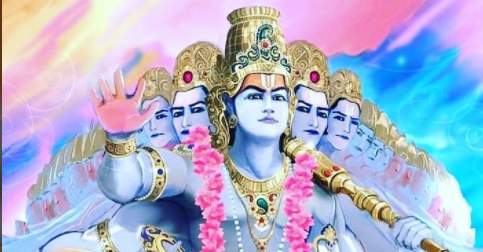The story of Kalawati and Lilavati in Satyanarayan Katha.
- Anshul Pandey

- Dec 16, 2020
- 3 min read

Vishnu Ji is the destroyer of all the three types of Taap- Adhyatmik, Adidaivik, and Adibhautik. Those who forget him suffer from innumerable sorrows. His wife Kamla has four sons - Dharma, Yagya, Raja, and Chor. The charity given to others is Dharma. For this you require Dhan. Swaha and Swadha conduct the dev Yagya and Pitra Yagya, this is known as Yagya for which again you require Dhan. Raja is the protector of Dharma and Yagya. He also requires Dhan for this.
Even the Chor requires Dhan so he destroys Dharma and Yagya. But wherever Satya stays, Dharma will always be there. The Vanik Sadhu forgot his Dharma so he and his family had to undergo so many sufferings. The Raja had taken away their wealth. His family too was undergoing this hardship.
One day Kalavati was very hungry. She went to a Brahmins house and there she saw the Brahmin performing Satyanarayan puja. She was intrigued and asked about this puja to Brahmin. He explained to her the benefits and the method to do this puja. So she immediately made a wish that if her father and husband returned, she too would perform this puja. The Brahmin blessed her. She returned home and told everything to her mother. So they both decided to conduct this puja on the next day.
Kalavati went to Vanik Sheelpal the next day to get some money to perform this puja. The Vanik gave her five coins saying that he was repaying her the loan her father had given to him. She happily comes home. The mother and daughter both perform the Satyanarayan puja and wish that Sadhu Vanik and the son in law return home soon.
Meanwhile, the King has a dream where Bhagwan tells him he should free the Sadhu Vanik and his son in law as they were arrested erroneously. The King tells this dream to his minister who in turn narrates that he too had the same dream. The King calls for both the prisoners. Both are made free as they were found to be telling the truth. Not only they are freed but are gifted a shipload of expensive things. The duo is now ready to leave. But now also they forget Bhagwan.
This is the time when Bhagwan decides to test them. He disguises himself and goes before them. The disguised Bhagwan asked the Vanik what was he carrying in the ship. The Vanik lies to him that he was carrying dry leaves and twigs. This lie costs him his wealth. All the wealth really becomes dry leaves. Now the Vanik starts crying. Somehow the son in law pacified the Vanik. They both realize that the tapasvi was no ordinary person. They both search for him and go to him.
They beg before him to pardon them since they have realized that he was no ordinary person and they want to know their mistakes. Then Bhagwan Satyanarayan who was in disguise reminds him about the Satyanarayan puja he had forgotten. Although Bhagwan had given him several opportunities, in his greed and carelessness he never remembered Bhagwan. The Sadhu Vanik realizes his mistake and admits his fault. Bhagwan Satyanarayan appears in his real form. Vanik falls at his feet. He bows before him several times.
He promises to give a substantial charity to the Purohit after he finishes performing the puja. Bhagwan blesses him and leaves. Meanwhile, his ship reaches after a week, his messengers come to him to inform the mother and daughter about the arrival of Vanik. Both were performing Satyanarayan puja. Hearing the news both of them are ecstatic and leave for the shore before eating the prasad. Since they stopped the puja midway, they committed a grave sin. The ship started sinking. Kalavati was delirious.
She prayed and pleaded to Satyanarayan Bhagwan and was ready to jump into the river. Someone reminded her about the forgotten prasad. The Akashvani announced their fault and the ship would return safely after the prasad was consumed. Kalavati and her mother followed this. The ship with all the boarders came up once again. The Vanik came home and arranged a Satyanarayan puja and gave gold coins in charity. Satyanarayan Bhagwan came and blessed him with a bright future. He continued the puja hence forth and lived happily here after.





























Comments